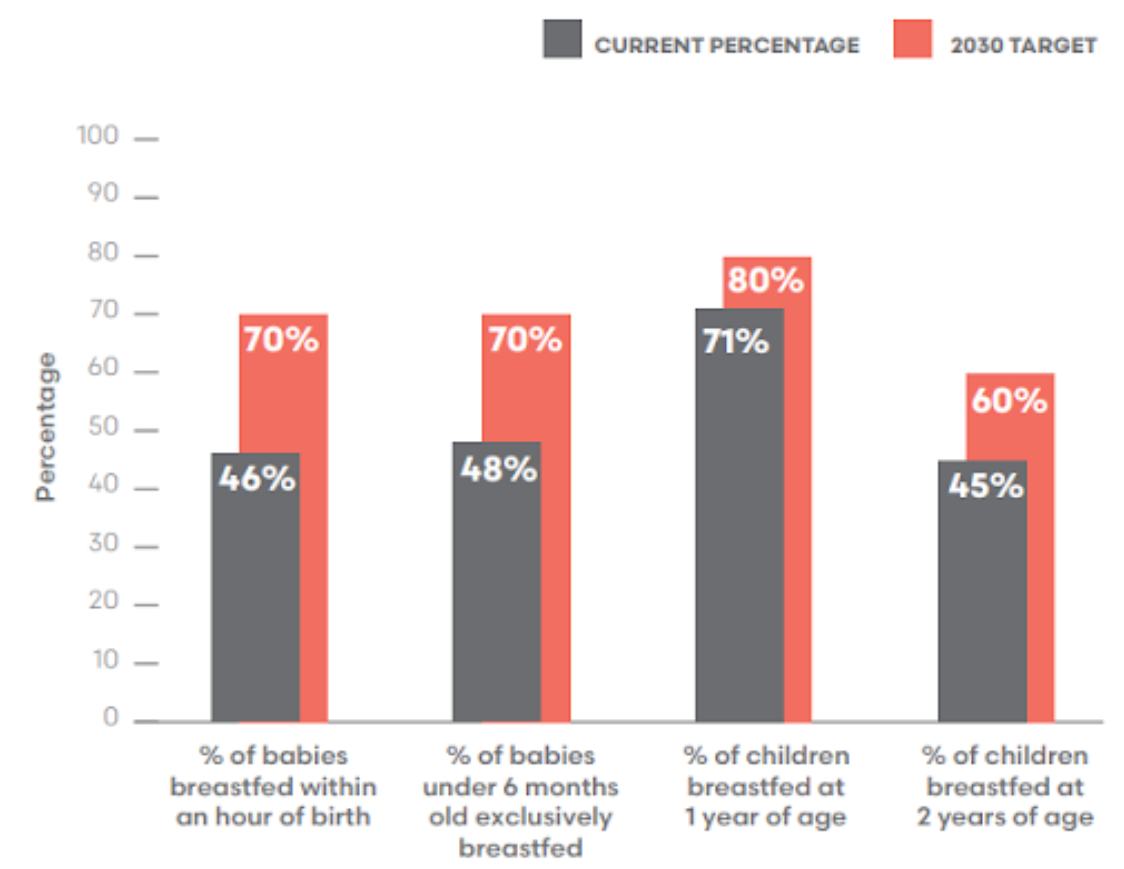-
CENTRES
Progammes & Centres
Location
Supporting breastfeeding through inclusive policies at work, households, and public spaces can go a long way in strengthening both families and economies
.png)
Breastfeeding has many benefits, for both the mother and the baby by providing much-needed nutrition and protection. For mothers, it aids with weight loss, reduces the risk of diseases and acts as a natural contraception. Globally, less than 50 percent of infants (0-6 months) are exclusively breastfed. The figure below indicates the current prevalence of breastfeeding practices against the global targets for 2030. Only 46 percent of infants are breastfed within an hour of birth.
Breastfeeding Rates vs Global Targets

Source: UNICEF
Undernutrition is associated with 45 percent of deaths in under-five children. The triple burden of malnutrition—stunting, wasting, and overweight endangers the survival and well-being of children. Globally, 148 million children under five are stunted, 45 million suffer from wasting and 37 million are overweight. This is an alarming situation.
It has been ascertained that improving infant and young child feeding practices is associated with child survival, growth, and development. The cost of not breastfeeding has a significant economic loss, amounting to between US$257 to 341 billion annually. A study on the effect of breastfeeding duration on cognitive development indicates improved IQ with prolonged duration of exclusive breastfeeding.
It has been ascertained that improving infant and young child feeding practices is associated with child survival, growth, and development.
Many factors contribute to the low prevalence of breastfeeding. Women, primarily, face barriers to breastfeeding at all levels—be it the household, community, or workplace. Other factors that undermine breastfeeding include gender inequities, socio-cultural norms, urbanisation, aggressive marketing of breastmilk substitutes, poor investment, and the lack of policies on breastfeeding protection. This year’s World Breastfeeding Week 2024 theme is ‘Closing the gap: Breastfeeding support for all.’ It calls for support for breastfeeding to reduce inequalities aligned with the thematic area of ‘Survival, Health and Well-being’ for achieving Sustainable Development Goals 1 (No Poverty), 3 (Good Health and Well-Being), 4 (Quality Education), 5 (Reduced Inequalities), and 11 (Sustainable Cities & Communities).
There is increasing evidence on how breastfeeding is integral to achieving gender equality including birth spacing and rights in the workplace. Breastfeeding support at the workplace also contributes to better work output and a sense of being valued. According to the International Labour Organisation, 830 million working women around the world do not have adequate maternity protection. A 22-year analysis investigating the impacts of US workplace breastfeeding policy finds that such policies improve breastfeeding rates. Breastfeeding is the smartest investment nations can make, not for the overall human capital development. An investment of US$1 in breastfeeding can bring a return of US$35. To meet the global nutrition target 2025, an investment of US$4.70 per newborn is required.
Despite the numerous positives, breastfeeding remains undervalued. A new tool called the ‘mother’s milk tool’ has been developed which shows the economic value of breastfeeding to society through women’s unpaid care work. Globally, around 35.6 billion litres of breastmilk is produced, of which 22 billion litres (38.2 percent) is lost due to cultural barriers and the external environment. India experiences a 40-percent loss in production of 8.7 billion litres annually.
Despite the numerous positives, breastfeeding remains undervalued. A new tool called the ‘mother’s milk tool’ has been developed which shows the economic value of breastfeeding to society through women’s unpaid care work.
As per the ILO Convention 2000, “A woman shall be provided with the right to one or more daily breaks or a daily reduction of hours of work to breastfeed her child.” Women are entitled to maternity protection and the Convention no. 183 states that ‘maternity leave should not be less than 14 weeks, while recommendation no. 191 suggests that maternity leave be at least 18 weeks.’ Supporting breastfeeding is beneficial to the employer having significant human and economic benefits. India’s Maternity Benefit Act 1961 amended in 2017 provides for 26 weeks of paid maternity leave. In a qualitative study from India on factors affecting breastfeeding and the provision of maternity leave, several factors including individual, familial and workplace contribute to successful breastfeeding. Fathers have a crucial role to play in supporting breastfeeding; their knowledge and education are enabling factors. Studies indicate the supporting role of fathers in providing comfort and emotional support in their partner’s breastfeeding journey and also in sensitising their peers in the community to its importance.
Aggressive marketing of breastmilk substitutes, attractive promotions and gifts have been shown to undermine women’s confidence and belief in breastfeeding.
Aggressive marketing of breastmilk substitutes, attractive promotions and gifts have been shown to undermine women’s confidence and belief in breastfeeding. The breast-milk substitute business has grown many folds, with sales worth US$73 billion in 2022, and a forecast for 2032 at US$ 185 billion. The 2024 report on ‘Marketing of breast-milk substitutes: national implementation of the International Code, status report 2024’ showed that 146 of the 194 countries have legal measures to support the International Code of Marketing of Breast-Milk Substitutes. According to UNICEF, breastfeeding rates vary across low-middle-income and high-income countries. The rates are naturally higher in countries that have policies and programmes to protect, support, and promote breastfeeding. In Norway, nearly 98 percent of babies are breastfed within the first hour of birth and 78 percent are exclusively breastfed till six months. Parents in Norway are entitled to 49 weeks of parental leave along with two breastfeeding breaks of 30 minutes each for nursing mothers.
Breastfeeding is a basic human right and collective responsibility. Women supported for breastfeeding by inclusive policies at health facilities, social security, good nutrition, and space to breastfeed at work can go a long way in strengthening both families and economies.
Shoba Suri is a Senior Fellow at the Observer Research Foundation.
The views expressed above belong to the author(s). ORF research and analyses now available on Telegram! Click here to access our curated content — blogs, longforms and interviews.

Dr. Shoba Suri is a Senior Fellow with ORFs Health Initiative. Shoba is a nutritionist with experience in community and clinical research. She has worked on nutrition, ...
Read More +